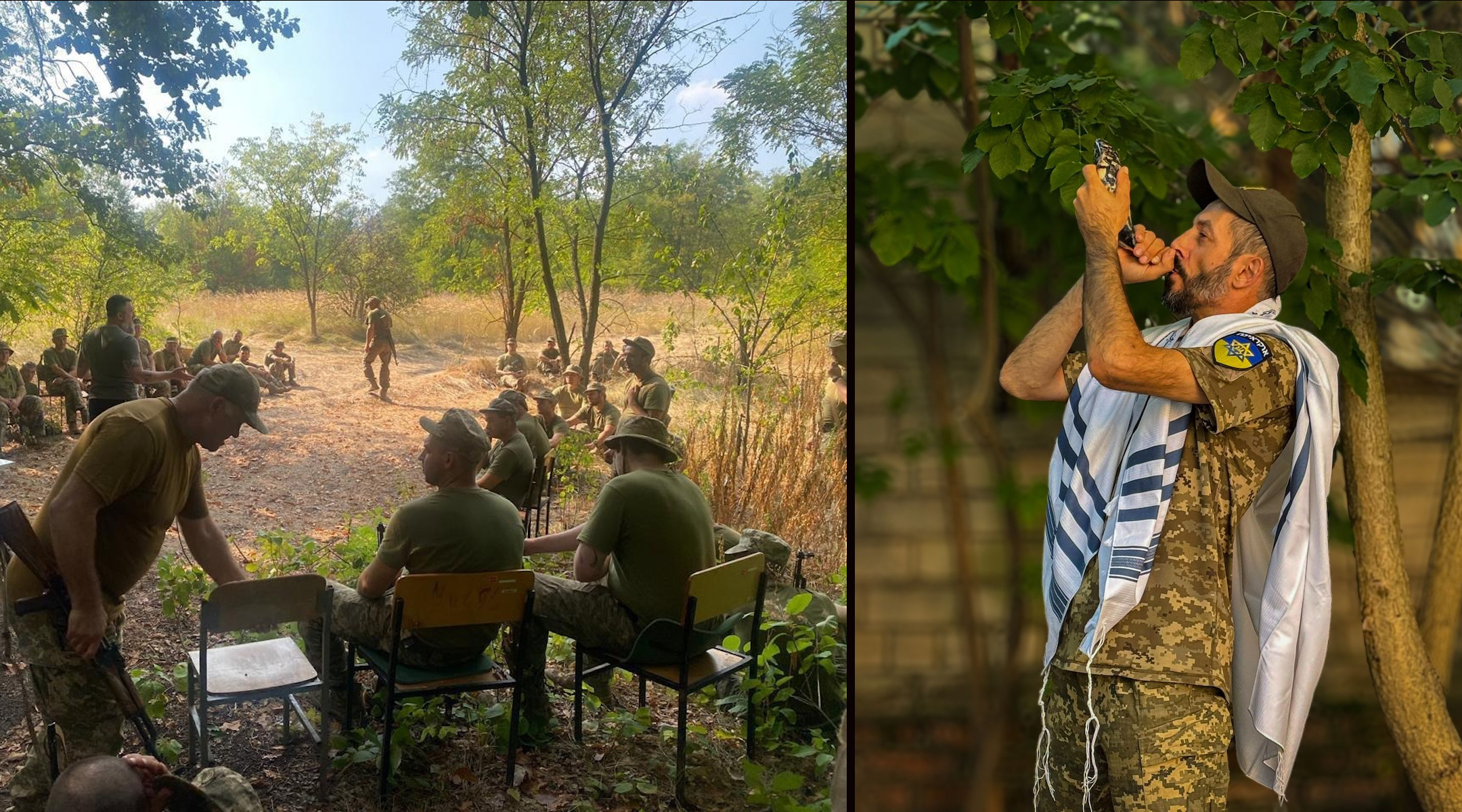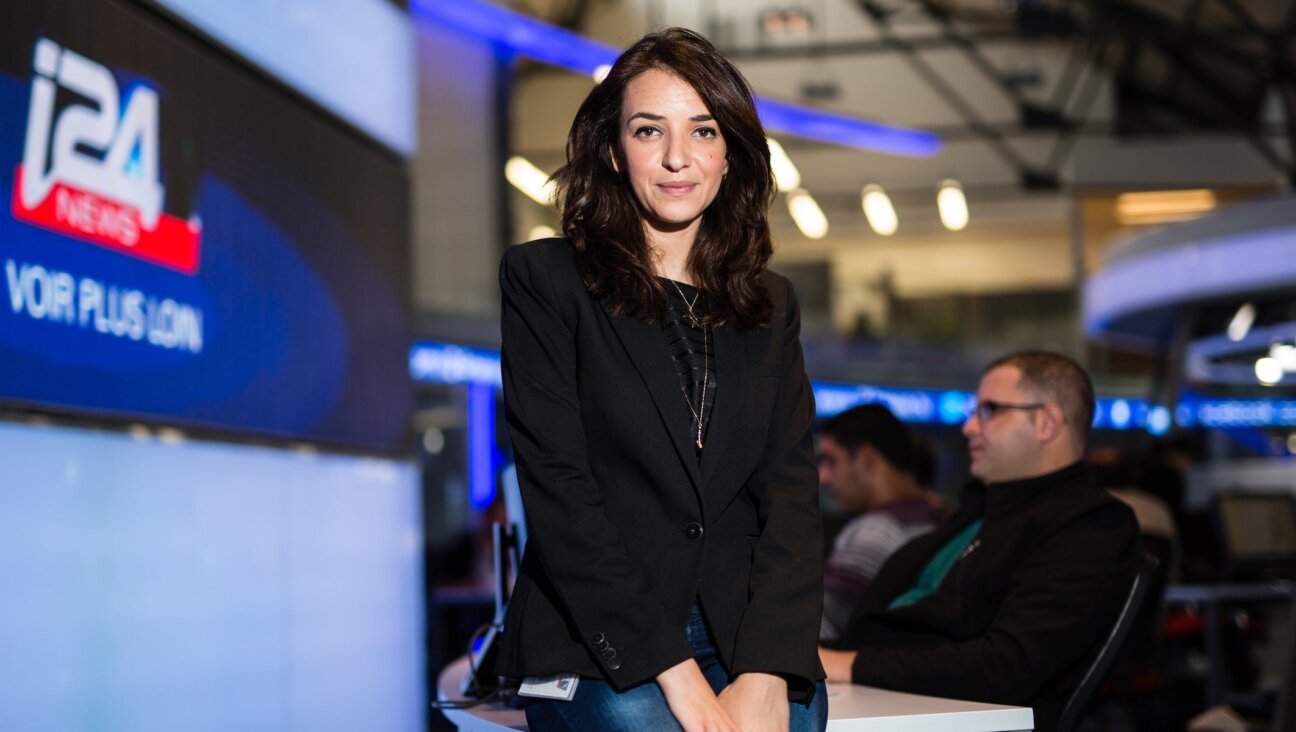Shofars blown along Ukrainian frontlines as part of Rosh Hashanah initiative for soldiers
Meanwhile, thousands of Hasidic men made their annual pilgrimage to Uman to celebrate the Jewish new year

Ukrainian soldiers learn about Rosh Hashanah in the field (left) while Аriel Chernetskiy blows the shofar in uniform, September 2024. (Courtesy Federation of Jewish Communities of Ukraine)
(JTA) — KYIV, Ukraine — For the first time since Ukraine was plunged into war in 2022, soldiers on the front lines could hear the blast of the shofar marking the Jewish new year.
The largest Jewish communal body in the country distributed shofars to Jewish soldiers stationed in dozens of military positions along the 620 miles of the Ukrainian frontline. Each received training in how to blow the ritual instrument.
“The soldiers’ response was overwhelming,” said Rabbi Yaakov Sinyakov, who led the initiative of the Federation of Jewish Communities of Ukraine, in a statement. “It reinforced their connection to their faith and heritage, even in the midst of conflict.”
The initiative is one of several notable Rosh Hashanah observances across Ukraine. Nonprofit and religious groups are supporting Jewish Ukrainians, who are needier on average than they used to be because of the war, in being able to celebrate. Meanwhile, thousands of Jewish pilgrims from outside of Ukraine have flooded into the country, against safety warnings, for an annual Rosh Hashanah pilgrimage that pays tribute to the influential Hasidic Rabbi Nachman of Breslov in the city of Uman.
But the efforts to serve soldiers are the biggest change over previous years, reflecting a growing mobilization during the grinding war.
The FJCU, which is affiliated with the Chabad-Lubavitch movement of Judaism, says it is supporting more than 1,200 Jewish soldiers serving in the Ukrainian army as professional soldiers, volunteers and a growing proportion of conscripts, according to the group’s chair, Rabbi Mayer Stambler.
Besides delivering the shofars, FJCU volunteers distributed hundreds of holiday kits containing kippahs and Rosh Hashanah ritual items such as candles and honey, eaten to symbolize a sweet new year.
The kits also include informational materials about the holidays and Ukrainian-language prayer books. The books have been translated as part of a broader trend in which Ukraine’s historically Russian-speaking Jewish communities have embraced Ukrainian as their communal language.
Apart from the materials transferred to soldiers, the FJCU has dispatched with the help of Chabad emissaries in 30 Ukrainian cities holiday kits to 51,000 Jewish households across Ukraine, reaching communities in 169 different locations.
“We are also providing festive meals for thousands,” Stambler said in a statement, adding that he expects synagogues across Ukraine to be filled for Rosh Hashanah services despite the ongoing war and the severe consequences it is bringing for Ukrainian Jews and non-Jews alike in the form of constant power outages, involuntary military mobilization and widespread casualties on the front lines.
The FJCU’s efforts are not the only ones meant to reach Jewish soldiers in the Ukrainian army. Last year, David Milman, who is affiliated with Kyiv’s Brodsky Synagogue, became the first official Jewish chaplain in the Ukrainian army. In that role, he has visited with wounded Jewish soldiers, provided pastoral care to their families and even facilitated ritual circumcisions for several men who did not have them as babies.
The head rabbi of the Brodsky Synagogue, Moshe Azman, recently buried his adopted son after his son was conscripted into the army shortly after becoming a father and killed in battle just weeks later.















